A
Age Restrictions
The minimum age of consent in Florida is 18. You must be 21 to buy or drink alcohol, and 16 to drive.
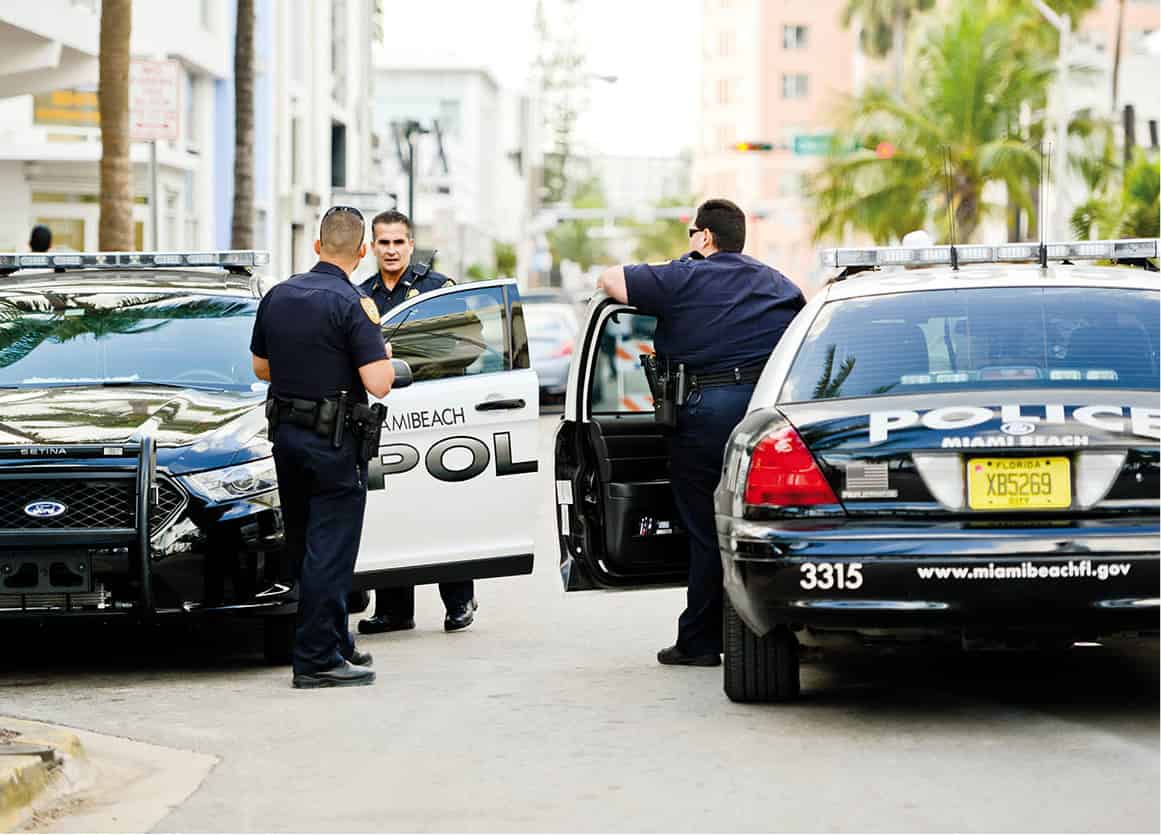
Miami Beach policemen
iStock
B
Budgeting
Miami is relatively expensive and you can expect to pay $5−8 for a pint of beer, although happy hours can halve that price. Budget for about $7 upwards for a glass of wine. A main course at a budget or fast food restaurant is about $8, at a moderate restaurant it would be about $10−15, and at more expensive places expect to pay $25 upwards. For a cheap hotel budget about $50−100 for a room. Make that $100−200 for a moderate hotel and $250−500 for a more expensive place.
A taxi from the airport should cost about $35−45. A single bus or Metrorail ticket valid for up to three hours and including a bus-to-bus transfer costs $2.25. A 1-day pass costs $5.65 and a 7-day pass is $29.25. Go Miami cards are available which include the Hop-On-Hop-Off bus and admission to 25+ attractions, but not public transport. Costs range from $69 for a 1-day adult card ($59 for children aged 3−12) to $182 for a 5-day card ($150 for children). There are also 2-day and 3-day options at $105/$85 and $136/$115 respectively.
C
Children
Although it’s a long way from the theme parks of Orlando, Miami is still a child-friendly place and a popular family holiday destination. There are plenty of attractions and activities suitable for the whole family. Many of the resort hotels have special programs for children, and baby-sitting options when it’s time for the parents to have fun.
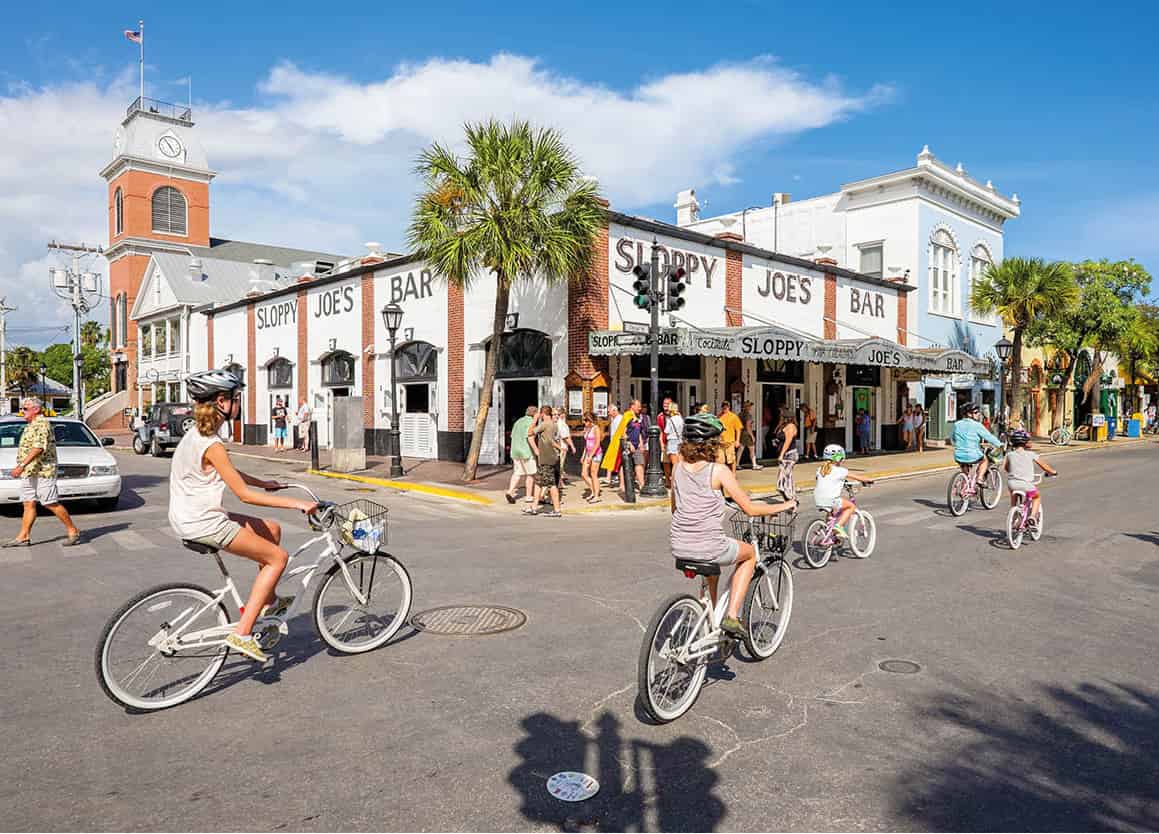
Cycling in Key West
Shutterstock
Clothing
For most of the year you’ll want to pack lightly and casually, perhaps with one or two smarter outfits if you plan to visit any high-end restaurants. Mostly, though, shorts and t-shirts will be fine, with jeans and casual shirts for chillier days and cooler evenings, even in winter. Winter’s also the dry season, but the rest of the year you should pack an umbrella, just in case.
Crime and Safety
Florida as a whole doesn’t have a squeaky-clean reputation when it comes to crime, and attacks committed against tourists ruin the state’s idyllic vacation-in-the-sun image periodically. The authorities have come up with various safeguards designed to protect visitors. Many of these are aimed at motorists, particularly in Miami, where a number of violent assaults have occurred when jet-lagged tourists disembarked long flights, missed the highway signs for Miami Beach, and found themselves in high-crime areas.
Car rental agencies have removed the special license plates that made rental cars an easy mark and have replaced them with standard-issue plates used by residents. In Miami, road signs have been improved and orange sunburst signs help guide visiting drivers along the main routes to and from the airport.
A little common sense goes a long way: don’t carry large sums of money or expensive video/camera equipment, don’t wear expensive or expensive-looking jewelry, and don’t flaunt your new smartphone. Walk purposefully and don’t make eye contact with unwelcome strangers or respond to come-ons. Don’t travel alone at night. Keep valuables in the room safe, if you have one, and ask the staff in your hotel for advice about areas that should be avoided. All that said, the crime rate in Florida is at its lowest for 45 years, and the overwhelming majority of people will have a trouble-free vacation in Miami.
Customs
You can bring into the US the following duty-free items: 1 liter of alcohol, if over 21 years of age; 200 cigarettes, 50 cigars (not Cuban) or 2kg of tobacco, if you’re over 18; and gifts worth up to $100 ($800 for US citizens). Travelers with more than $10,000 in US or foreign currency, travelers checks, or money orders must declare these upon entry. Meats, fruits, vegetables, seeds, or plants (and many prepared foods made from them) cannot be brought in to the country and must be disposed of in the bins provided before entering. For more information, contact US Customs & Border Protection (tel: 877-227-5511; www.cbp.gov).
D
Disabled Travelers
From ADA-compliant hotels to on-loan beach chairs and even mobility-assisted snorkeling and hang-gliding, visitor services throughout Miami and Florida go to great lengths to make sure everyone enjoys barrier-free access to sun and fun.
Under the Americans with Disabilities Act (ADA), accommodations built after January 26, 1995, and containing more than five rooms must be usable by persons with disabilities. Older and smaller inns and lodges are often wheelchair-accessible. For the sight-impaired, many hotels provide special alarm clocks, captioned television services, and security measures. To comply with ADA hearing-impaired requirements, hotels have begun to follow special procedures; local agencies may provide TTY and interpretation services. Check with the front desk when you make reservations to ascertain to what degree the hotel complies with ADA guidelines. Ask specific questions regarding bathroom facilities, bed height, wheelchair space, and availability of services.
Restaurants and attractions are required to build ramps for those with limited mobility. Many major attractions have wheelchairs for loan or rent. Some provide menus, visitor guides, and interpreters for hearing- and seeing-impaired guests.
You can hire a wheelchair-accessible taxi from several companies including Crown Taxi (305‐445‐5555) and Comfort Wheelchair Transportation (305‐532‐5555).
All public buses are now wheelchair-accessible, with reduced fares in place. For more information on public services for disabled travelers visit the Miami−Dade County government website: http://www.miamidade.gov/Portal_Content/government/disabilities.asp.
For more information, read Wheelchairs on the Go: Accessible Fun in Florida by Michelle Stigleman and Deborah Van Brunt. For disability resources in Florida, contact the Clearinghouse on Disability (tel: 850-497-3423 or 877-232-4968). The Society for the Advancement of Travel for the Handicapped (tel: 212-447-7284; www.sath.org) publishes a quarterly magazine.
E
Electricity
The United States uses 110–120 volts AC (60 cycles). If visiting from outside North America, you may require an electrical adapter with two flat pins for any electronics or appliances you want to bring. You won’t need a transformer.
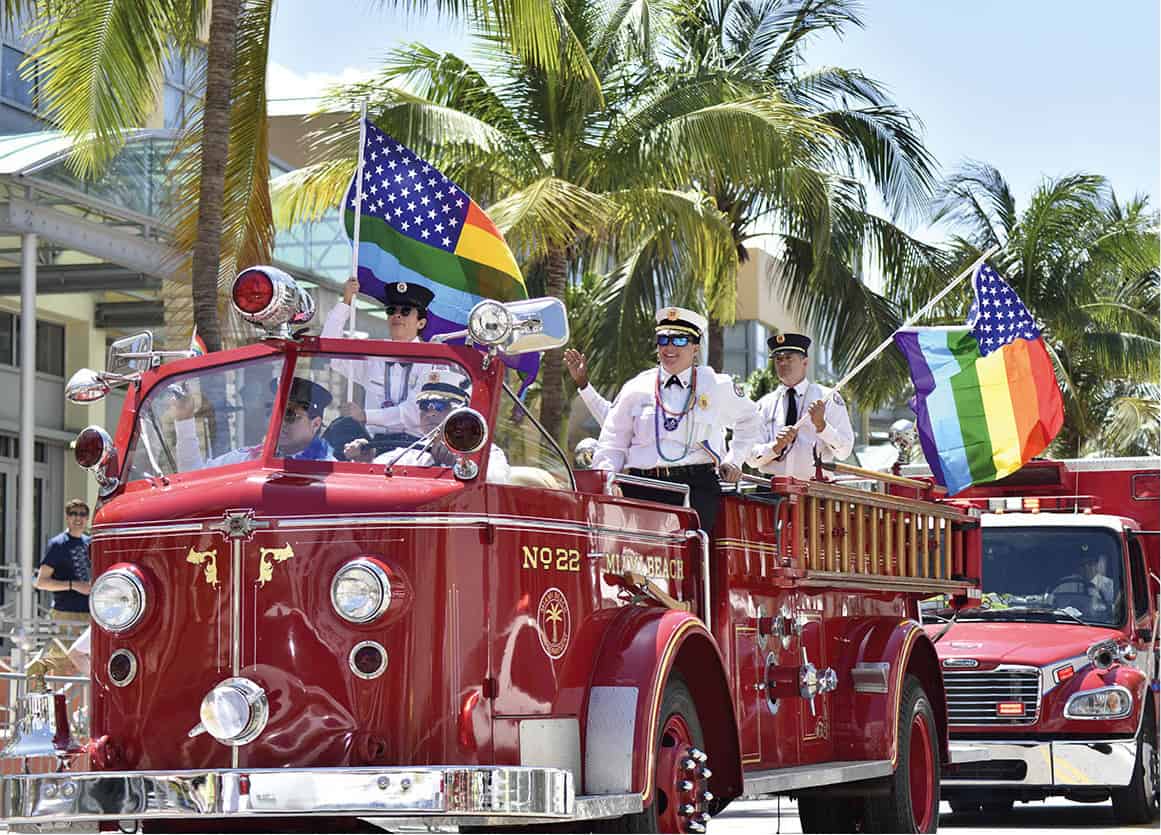
The Miami Gay Pride
Shutterstock
Embassies and Consulates
Foreign embassies are all located in Washington, DC, with several consulates in or near Miami, including:
Australia: Consulate General of Australia, 251 Buttonwood Drive, Key Biscayne, FL 33149; tel: 305-519-8814.
Canada: Consulate General of Canada, 200 South Biscayne Blvd., Suite 1600, Miami, FL 33131; tel: 305-579-1600; www.miami.gc.ca.
Ireland: Consulate General of Ireland, 400 Fifth Avenue South, Suite 301, Naples, FL 34102; tel: 239-649-1001.
UK: Consulate General of United Kingdom, 1001 Brickell Bay Drive, Suite 2800, Miami, Florida 33131; tel: 305-374-1522.
Emergencies
Wherever you are in Miami or the rest of Florida, in case of emergency dial 911 to contact the local police, fire, or ambulance service.
Etiquette
Miami is a very relaxed and multinational city, with casual clothing the norm, or smart-casual for more upmarket establishments. Formality is more important when it comes to greetings, whether it be with friends, waiters, shop assistants, or hotel staff. Friends greet each other with a peck on the cheek.
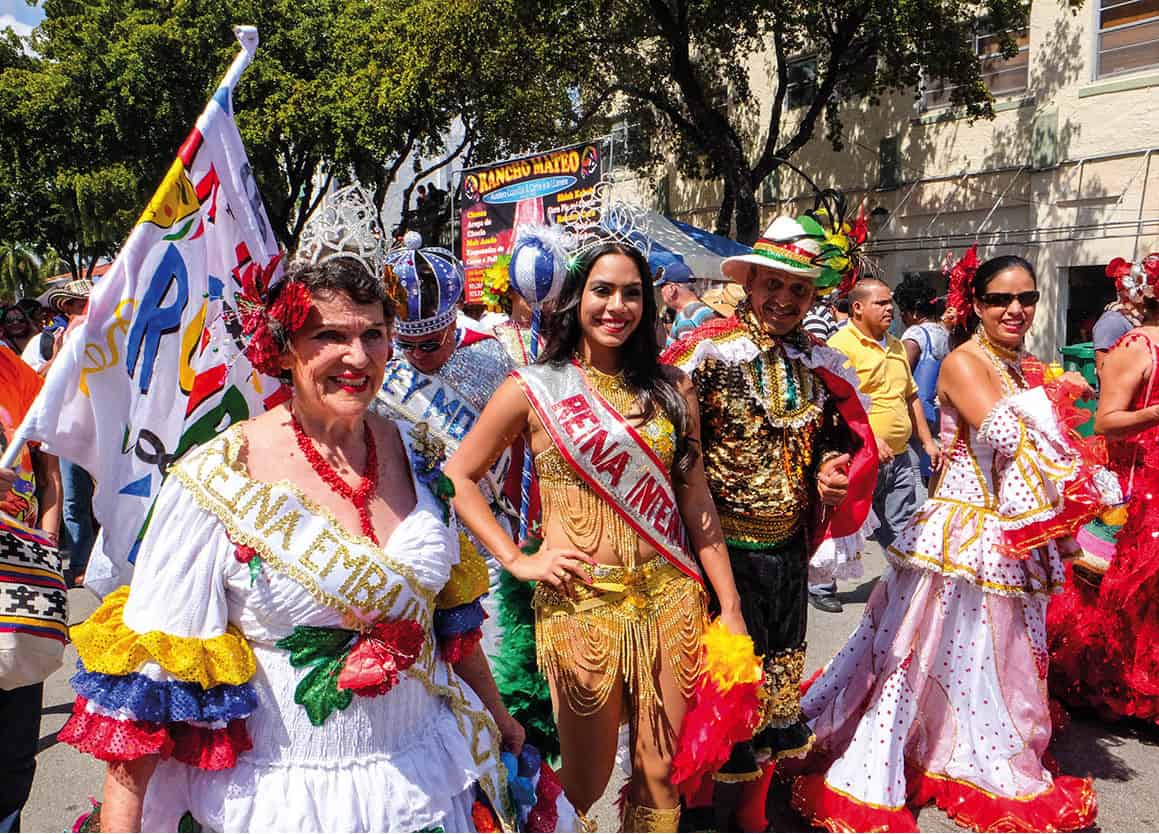
Calle Ocho street festival
iStock
F
January
Orange Bowl. The final game between Florida’s two best college football teams. Tel: 305-341-4700. New Year’s Day.
Art Deco Weekend. A celebration of Miami Beach’s famous Art Deco architecture. Events include a street fair, music, and an art show. Mid-January. Tel: 305-672-2014. www.artdecoweekend.com.
Dr Martin Luther King Jnr Day Parade. January 15th sees parades and celebrations in honor of the civil rights leader.
Miami Marathon and Half-Marathon. Late January is usually when the city’s biggest marathon and half-marathon races take place. www.themiamimarathon.com.
February
Coconut Grove Arts Festival. The largest arts festival in Florida. Mid-February. Tel: 305-447-0401. www.coconutgroveartsfest.com.
Miami International Boat Show takes place mid-February over several days in Key Biscayne. www.miamiboatshow.com.
South Beach Wine and Food Festival. Huge festival runs for six days in late February. http://sobefest.com.
March
Carnaval Miami. Hispanic heritage festival in Little Havana usually starts in February and runs on into March. Tel: 305-644-8888. www.carnavalmiami.com.
Miami Open. This tennis tournament takes place in late March/early April at the Tennis Center at Crandon Park in Key Biscayne. www.miamiopen.com.
April
Miami Beach Gay Pride celebrations take place over three days in early April. www.miamibeachgaypride.com.
May
Miami Fashion Week. Showcase fashion event at the Convention Center. http://miamifashionweek.com.
October
Miami Broward Carnival. Day-long celebration of Caribbean culture in early October at the Miami−Dade County Fairgrounds. http://miamibrowardcarnival.com.
November
Miami International Auto Show. The city’s big car show fills the Convention Center for ten days. www.sfliautoshow.com.
Miami Book Fair International. This international congress of authors, publishers, and agents fills the city. Also street vendors, entertainment. Third week in November. Tel: 305-237-3258. www.miamibookfair.com.
December
Orange Bowl Parade. The nation’s top marching bands accompany amazing floats before the football bowl game. December 31. Tel: 305-341-4700.

Sunset in Key West
iStock
G
Gay and Lesbian Travelers
Although Florida as a whole is rather conservative, that’s not the case everywhere and Miami, especially South Beach in particular, is very gay-friendly. For more information, contact the South Beach Business Guild (tel: 305-534-3336). The Gay and Lesbian Yellow Pages (tel: 800-697-2812; www.glyp.com) offers regional information on GLBT activities in Florida. The Damron Company (tel: 415-255-0404 or 800-462-6654; www.damron.com) publishes guides aimed at lesbians and gay men and lists gay-owned and gay-friendly accommodations nationwide.
H
Health
Most visitors to Miami will encounter no health problems during their stay: sunburn and mosquito bites in summer are the main nuisance. If you need medical assistance, ask the reception staff at your hotel or consult the Yellow Pages for the physician or pharmacist nearest. The larger resorts may have a resident doctor. If you need immediate attention, go to a hospital emergency room (ER).
Pharmacies and Hospitals
You’ll find numerous CVS pharmacies and several Walgreens pharmacies in Miami, as well as independent pharmacies and some other pharmacy chains. You’ll generally find good and helpful service. Many of these are open 24 hours, including the University Miami Hospital Pharmacy, 1400 NW 12th Avenue, Miami, FL 33136 (tel: 305-325-5722). This is also one of the city’s major hospitals.
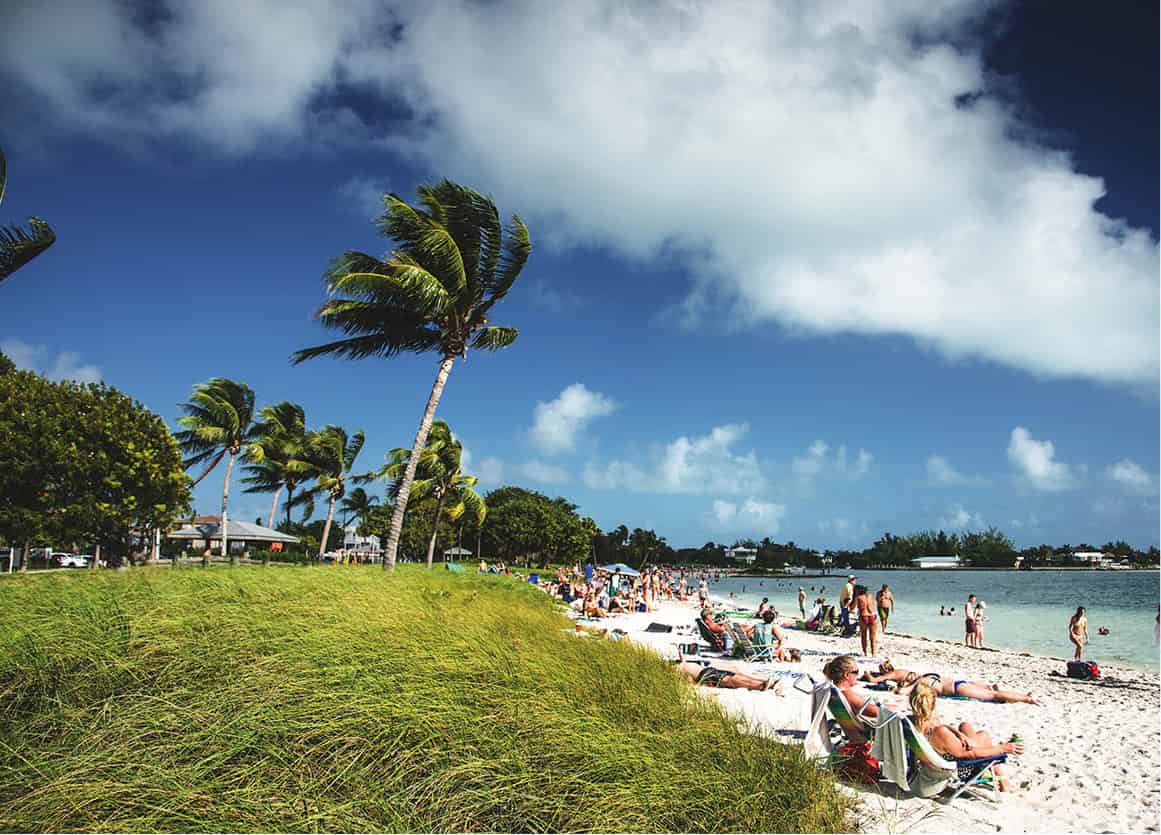
On the beach at Key Largo
iStock
Insurance
There is nothing cheap about being sick in the US – whether it involves a simple visit to the doctor or a spell in a hospital. The initial fee charged by a good hospital might be $250, and that’s before the additional cost of x-rays, medicines, examinations, and treatments have been added. Walk-in medical clinics are much cheaper than hospital emergency rooms for minor ailments. Foreign visitors are strongly advised to purchase travel insurance before leaving to avoid high urgent-care costs. Be sure you’re covered for accidental death, emergency medical care, trip cancelation, and baggage or document loss.
Health Hazards
Insects
People aren’t the only creatures attracted to Florida’s sun and sand. Miami sees its fair share ofockroaches, or palmetto bugs, fire ants, ‘love bugs’ (bibinoid flies), mosquitoes, and sand flies.
Sunburn
One of the most common sights in Florida is that of the over-baked tourist. If you are determined to get a suntan, do so gradually. Always wear a broad-brimmed hat, good-quality sunglasses, and use a high-factor sunscreen (40 plus) to protect your skin. Even on overcast days the sun’s ultraviolet rays penetrate the clouds, giving you a false sense of safety. Dehydration and salt deficiency can lead to heat exhaustion, especially if taking medications or drinking alcohol or strong coffee. It’s important to moderate these, drink plenty of water, and take time to acclimate to the heat and humidity if you aren’t accustomed to it.
Heatstroke is a common problem for those from northern climates and is a potentially serious condition, so don’t ignore the telltale signs. Long, uninterrupted periods of exposure to high temperatures can lead to heatstroke. If you feel dizzy and fuzzy-brained, feel muscle weakness and start to stumble, and your skin has become pale and dry rather than red and sweaty, immediately begin spraying yourself with water or, better yet, pour it on. To head off problems, keep major arteries in your neck cool by wearing a wet bandanna or cotton shirt with a collar.
Hours and Holidays
Stores are often open seven days a week and tend to stay open into the evening, especially in tourist areas. Government offices are usually open only on weekdays from 8am or 9am to 4pm or 5pm. Post offices are usually open weekdays from 8am to 5pm and have limited hours on Saturday morning.
Public holidays in the US include: New Year’s Day (January 1), Martin Luther King’s Birthday (January 15), President’s Day (third Monday in February), Memorial Day (last Monday in May), Independence Day (July 4), Labor Day (first Monday in September), Columbus Day (second Monday in October), Veteran’s Day (November 11), Thanksgiving (fourth Thursday in November), and Christmas Day (December 25).
I
Internet Facilities
The vast majority of accommodations in Miami will have WiFi available. The more expensive the property, the more likely you will have to pay for internet access, with more budget and midrange accommodations offering free internet. Other options include using places like Starbucks and McDonald’s, which offer free WiFi to customers, as do many bars.
M
Media
The most widely read newspaper in Florida is the Miami Herald, which also has a very popular Spanish-language section sister paper, El Nuevo Heraldo. You can usually pick up USA Today from newspaper dispensers in the street or receive a free copy at certain hotel chains. Other national newspapers available in dispensers or good newsstands and bookstores include the New York Times, Washington Post, and Wall Street Journal. International newspapers are less common but can be found in some libraries, book stores, and cafés.
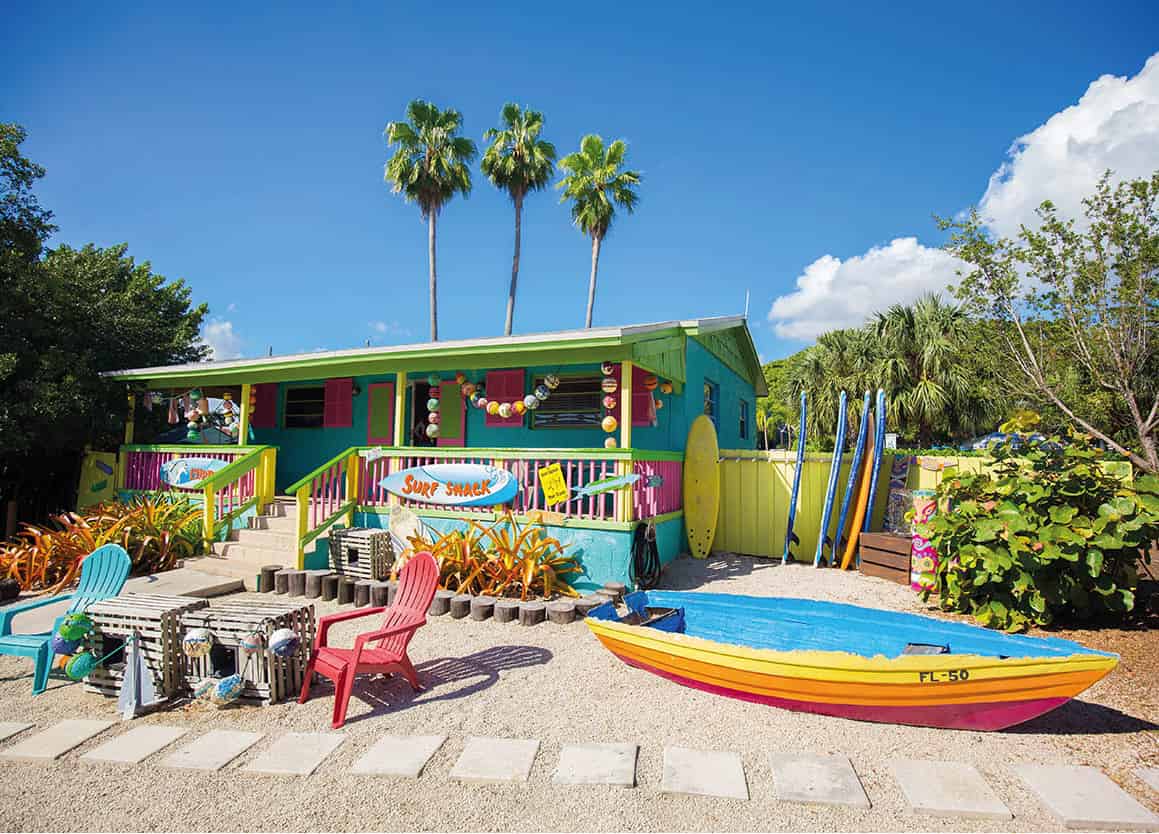
Surf shop in Virginia Key
Shutterstock
Money
American dollars come in bills of $1, $5, $10, $20, $50, and $100, all the same size. The dollar is divided into 100 cents. Coins come in 1 cent (penny), 5 cents (nickel), 10 cents (dime), 25 cents (quarter), 50 cents (half-dollar), and (rarely seen) $1 denominations.
Credit cards
All credit cards are widely accepted.
Cash machines
Cash or ATM machines are numerous throughout Miami.
Travelers’ cheques
You can change travelers’ cheques widely, and it will be easier if you get them in US dollars than in your own local currency.
Tipping
The US has a tipping culture and 15 percent is the norm for most things, sometimes 20 percent for especially good service. Have lots of $1 bills handy for tipping bellboys ($1 per bag), doormen, and anyone else who provides a service. Miami is notorious for adding tips to bills automatically, so always check to avoid double-tipping.
Taxes
Sales tax will be automatically added to your bills, and in Miami this is 7 percent. Of this, 1 percent is the county sales tax and 6 percent the Florida state sales tax. If you travel out of Miami−Dade County, the county tax rate may change.

St. Bernard de Clairvaux cloister
Shutterstock
P
Post
The US mail is run by the United States Postal Service (USPS), and private delivery services such as UPS and Fedex are usually used for bulkier, more valuable or more urgent items. Americans commonly complain about the USPS but the service is pretty reliable. You have to allow a few days if mailing items across the US. You can also buy stamps in some drugstores and hotels.
US mailboxes are blue and usually freestanding on the streets, though they are not as common as in European countries. Finding a post office is usually the best option. One of the main offices Downtown is at 150 SE 2nd Ave #103, Miami, FL 33131 (tel: 800 275-8777).
R
Religion
The US is predominantly a Christian country, and while most people are tolerant of other religions there are always exceptions, especially in the south.
S
Smoking
In Florida smoking is not allowed in bars, restaurants and other public places, although there are some exceptions so ask. As a rule, smoking is the exception rather than the norm.
T
Telephones
The area code for Miami is either 305 or 786. If dialling from overseas you must dial the full area code followed by the local number. If dialling from within the area code itself, you should still dial the full number with the area code.
The US country code is 1. To call the USA from Europe dial 00 followed by the country code, 1, followed by the area code and number. From Australia dial 0011 then the country code and number. If calling from Canada simply dial the country code, 1, followed by the number.
Mobile (Cell) Phones
In the US they are cell phones, not mobile phones. American cell phones use GSM 1900 or CDMA 800, a different frequency from other countries. Only foreign phones operating on GSM 1900 will work in the US. You may be able to take the SIM card from your home phone, install it in a rented cell phone in the US, and use it as if it’s your own cell phone. Check with your own phone service provider before leaving. You could also consider buying a budget phone after you’ve arrived in the US, from somewhere like Walmart. TracFone and Net10 are popular, cheap non-contract options.
Cell phones can be rented for about $45−60 a week in the US. Also available are GSM 1900 compatible phones with prepaid calling time, such as those offered by T-Mobile (www.t-mobile.com). Be aware that you probably won’t be able to pick up a signal in remote rural areas, such as the Everglades and the Florida Keys. Check the coverage before starting out.
Time Zones
The continental US is divided into four time zones. From east to west, later to earlier, they are Eastern Standard Time, Central Standard Time, Mountain Standard Time, and Pacific Standard Time, each separated by one hour. Miami is on Eastern Standard Time (EST), five hours behind Greenwich Mean Time. On the first Sunday in April, Floridians set the clock ahead one hour in observation of daylight saving time. On the last Sunday in October, the clock is moved back one hour to return to standard time. When it’s noon in Miami it’s also noon in New York, and 5pm in London.
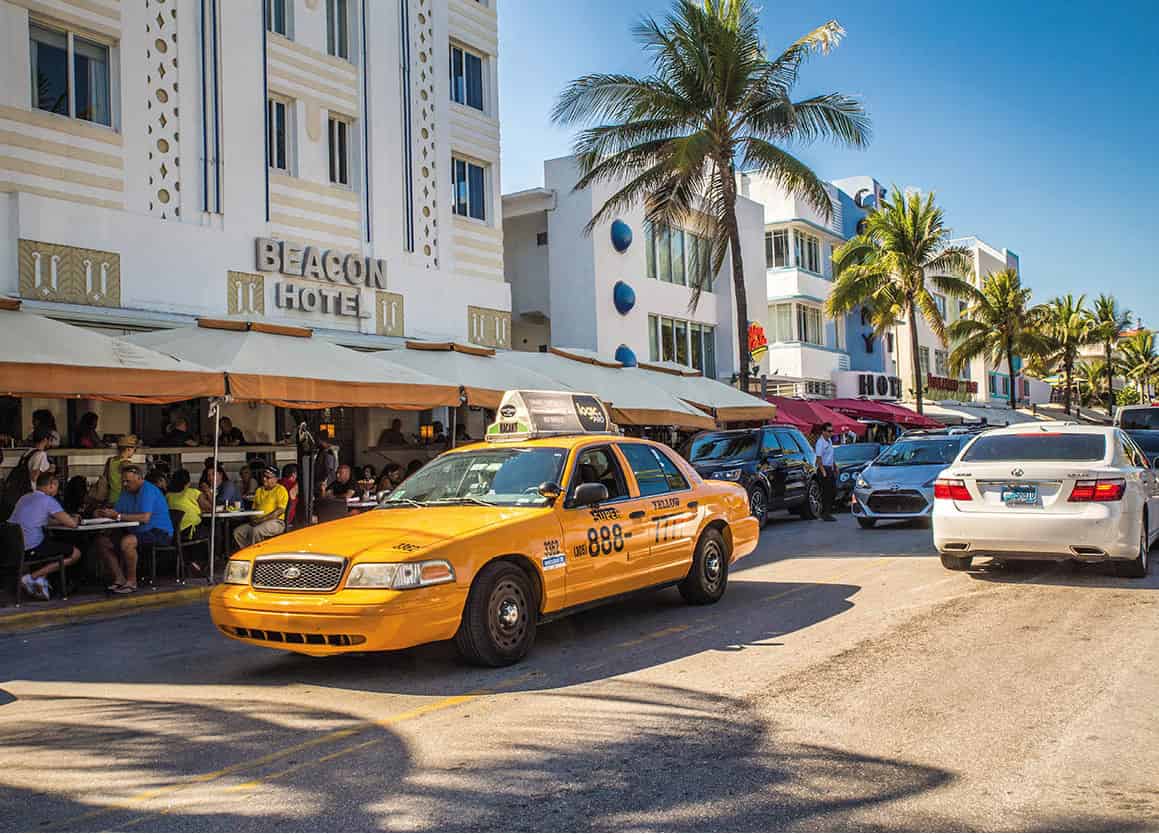
Taxi on Ocean Drive
iStock
Toilets
Ask for the restroom, not the toilet. Free public toilets are rare in Miami so look for larger department stores. If using one in a bar, a café or a store it’s polite to buy something too, though not usually essential.
Tourist Information
The main tourist information office for Miami is the Greater Miami Convention and Visitors Bureau, which is in the Convention Center at 701 Brickell Avenue, Suite 2700 (tel: 305-539-3000 or 800-933-8448; www.miamiandbeaches.com). You can also find information at the Miami Beach Chamber of Commerce, 1920 Meridian Avenue, Suite 1 (tel: 305-674-1300; www.miamibeachchamber.com). Another good source of information is the Art Deco Welcome Center, 1001 Ocean Drive, Miami Beach (tel: 305-531-3484; www.mdpl.org).
Transport
Arrival by Air
Miami International Airport (tel: 305-876-7000; www.miami-airport.com) is the main international airport for southern Florida and is 8 miles (13km) northwest of downtown Miami. There are three terminals: North, Central, and South. International arrivals come in at both North and South terminals, depending on the airline. The Central terminal is used more by smaller and budget airlines, and there are plans to redevelop this in the next few years.
Miami is a major international arrival center for people transferring to other destinations, such as the Caribbean, for cruise ships, and for elsewhere in the US. Even if your final destination is Miami, you must be prepared for long waits at immigration.
Car Rental
If you’re picking up a car when you arrive, all the major car rental companies have a presence at the airport, in the Car Rental Center at the airport’s Central Station. See also ‘Driving’ below.
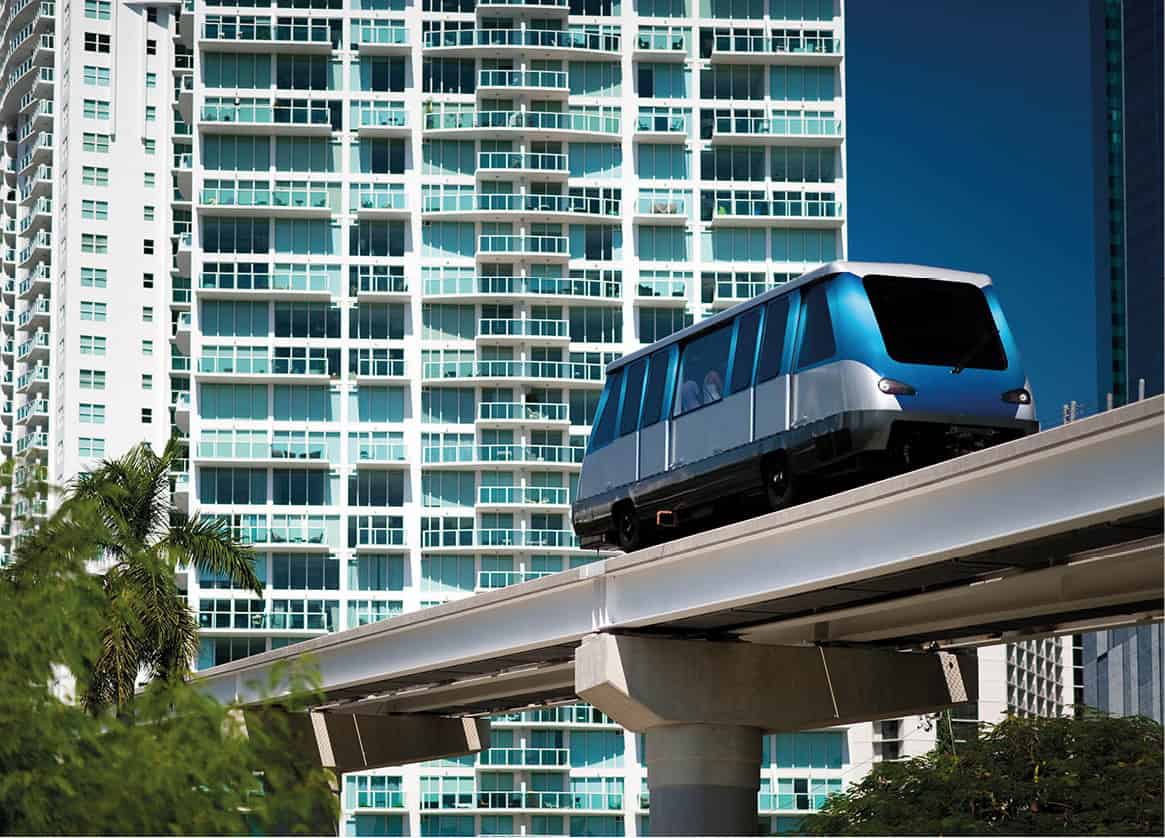
The Metromover
iStock
Taxis
A taxi from the airport to downtown Miami should cost about $35−45. You’ll find official taxi stands outside the baggage claim area.
Ground Transportation
The airport has good ground transportation connections into the city from the Central Station, which is connected to the airport by the MIA Mover electric train system, a fast and efficient way of moving people around the airport. At Central Station there are both Metrobus and Metrorail connections into the city. Tickets currently cost $2.25. There are also Hotel Shuttle and SuperShuttle services. You’ll find stands outside the baggage claim area. Beware of illegal touts for taxis and other services. The official systems work fine and are inexpensive.
Public Transportation
Miami has a good Metrobus and Metrorail public transportation system (www.miamidade.gov/transit), with a basic fare of $2.25 per ride. This allows for transfers and lasts for up to three hours. You can also get a 1-day pass for $5.65 and a 7-day pass for $29.25.
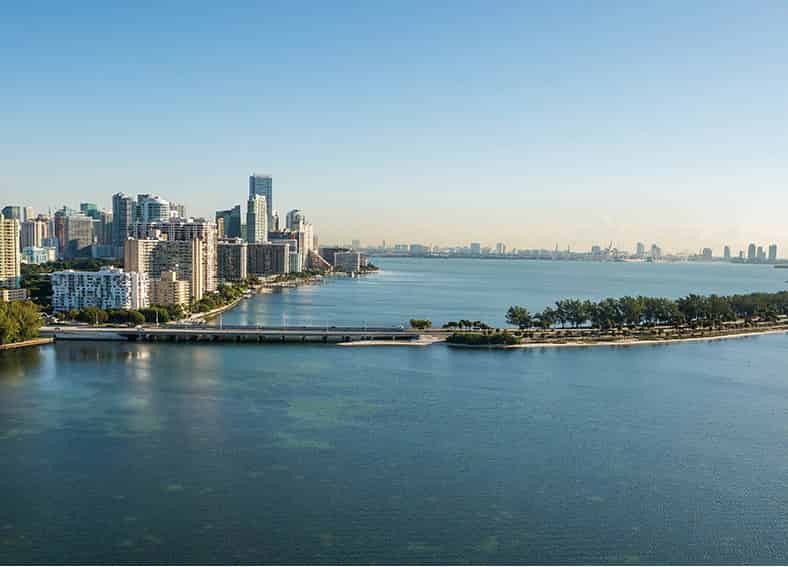
Brickell high-rises and the Rickenbacker Causeway to Key Biscayne
Shutterstock
If using the Metrobus you can pay the flat fare in cash when you board, but you must have the right change and you forfeit the ability to transfer between buses. Metrorail does not accept cash fares. To use the system you must either have an EASYCard or an EASY ticket, which are also valid on Metrobus.
Miami also has a bike sharing scheme, with about 1,000 bikes available across 100 rental stations around the city. For details of how the scheme works visit http://citibikemiami.com.
EASY Cards and Tickets
The EASY Card is aimed more at residents though visitors can buy one too. You can get them at any Metrorail station, at ticketing kiosks throughout the city, at the airport, and at various stores and other outlets from pharmacies to liquor stores (www.miamidade.gov/transit/easy-card-sales-outlets.asp).
The card is a plastic credit-card style card which is valid for 20 years and can carry either a running balance you can top up, or a 1-day, 7-day or monthly travel pass. The basic card costs $2. You can buy and top it up online, and if you live in the US you can have it shipped to you before you travel to Miami.
The EASY Ticket can be more convenient for visitors. It works in much the same way as an EASY Card but is made of paper and lasts for only 60 days. If you’re planning to use public transport at least a few times, paying for an EASY Card is the best option.
Miami taxis are yellow cabs. It can be hard to hail one on the streets so it’s usually best to book one by phone or go to a taxi rank. The basic rate is currently $2.95 for the first 1/6 mile, and then $0.85 per 1/6 mile up to one mile. This makes the fare for a mile-long journey $7.20. After that the rate is $0.40 for each 1/6 mile, so a 2-mile trip would cost $9.60.
Local firms include American Taxi (305‐947‐3333), Miami−Dade Taxi (305‐551‐1111), Crown Taxi (305‐445‐5555) and Super Yellow Cab (305‐888‐7777).
Driving
Renting a car, and the price of gas, is cheaper in the US than in many countries so you might want to consider hiring a car for at least part of your vacation. It would allow you to do things like drive through the Florida Keys (for more information, click here) or explore more of the Everglades (for more information, click here). However, if your main aim is to stay in Miami and enjoy it, you won’t need a car. It’s a busy city and traffic gets very congested, so a combination of walking, public transportation, and taxis should get you most places.
If you’re visiting from elsewhere in the US and bringing your own car, allow for the traffic congestion when figuring out how long it will take to get from A to B. Miami is a long way from being as bad as Los Angeles, but it can still be very slow.
See also the Crime and Safety section for problems of relevance to motorists.
Driving on the Right
In the US they drive on the right. Visitors from countries like the UK, who drive on the left, should find it easy to adjust, especially as most US rental cars are automatics, giving you one less thing to think about.
Turning Right on a Red Light
When you come to a red light in Florida you must come to a complete stop. If you are in the right-hand lane you can then turn right on a red light if it is safe to do so and provided there isn’t a NO TURN ON RED warning sign.
Priority to the Left
The US has very few roundabouts compared to other countries, although more are being introduced in parts of Florida. If approaching a roundabout then priority goes to traffic on your left. As many American drivers are not used to roundabouts, always be cautious when using one as not everyone is familiar with the rules.
If approaching a 2-way, 3-way or 4-way stop with other drivers coming, then priority goes to the first driver to reach the junction and stop. If one or more arrive at the same time, priority goes to the driver to your left. If priority is unclear then you just have to work it out.
Renting a Car
You must be 21 to rent a car in Florida, although if you’re under 25 some companies may charge a higher rate. You will also need your passport, US or local driving license, and credit card. Without a credit card you will be expected to put down a hefty cash deposit. The major companies allow you to pick up in one location and drop off elsewhere, although sometimes this can incur a hefty fee.
Go over the insurance coverage provisions carefully with the agent before signing the rental agreement. Loss Damage Waiver (LDW), or Collision Damage Waiver (CDW), is essential. Without it, you’ll be liable for any damage done to your vehicle in the event of an accident, regardless of whether or not you are to blame. You are advised to pay for supplementary liability insurance on top of standard third-party insurance. Insurance and tax charges can add a lot to an otherwise inexpensive rental, so take it into account in your budgeting. Also, be sure to check your rental car carefully for existing damage, and make a careful note of any dents or dings before leaving the lot.
Drink-driving
If you’re under-21 in Florida then there is a zero-tolerance approach to drink-driving and you cannot drive with a Blood Alcohol Content of higher than .02, which is the equivalent of one very small drink. If you’re 21 or over then the limit is .08. This is not the equivalent of four drinks. There are heavy fines, the confiscation of your licence, and possibly even jail, so don’t take the risk.
Car Hire Companies
All the major international car rental companies have offices both in Miami and at the airport. Some of the main names include Alamo (1-800-327-9633 or 305-633-6076), Avis (1-800-331-1212 or 305-341-0936), Budget (1-800-527-0700 or 305-871-2722), Enterprise (1-800-325-8007 or 305-633-0377), and Hertz (1-800-654-3131 or 305-871-0300).
Parking
Street parking at meters is hard to find and expensive, and a better option is to use a parking garage. There are numerous parking garages in downtown Miami, and around, and competition keeps prices relatively low. For detailed information go to the website of the Miami Parking Authority: www.miamiparking.com.
V
Visas and Passports
Foreign travelers to the US (including those from Canada and Mexico) must carry a passport, valid for at least six months. A visa is required for visits of more than 90 days. A visa is also required by citizens of any countries not accepted in the US’s Visa Waiver Program scheme, and for visits of over 90 days. Travellers from the UK, Australia, and New Zealand are all eligible for the Visa Waiver Program, but not those from Canada, who only requite a passport. If eligible, the requisite details must be given when booking your ticket or before you travel otherwise you may be denied entry.
A return ticket is also normally required, and you may be asked to show it at immigration control. Note that if you have a connecting flight when travelling to the US, your point of entry is where you first touch down and you will be required to pass through immigration here. Immigration queues can be long and slow, so even if you have all the correct documentation, allow plenty of time to catch your connecting flight.
For the most current information, contact the US Department of Homeland Security at www.dhs.gov.
W
Weights and Measures
Miami, like the rest of the US, uses the Imperial system for weights and measures.
Women Travelers
Women travelers will be as safe in Miami as in any other large US city, with the usual proviso of avoiding unsafe areas (see also Crime and Safety).